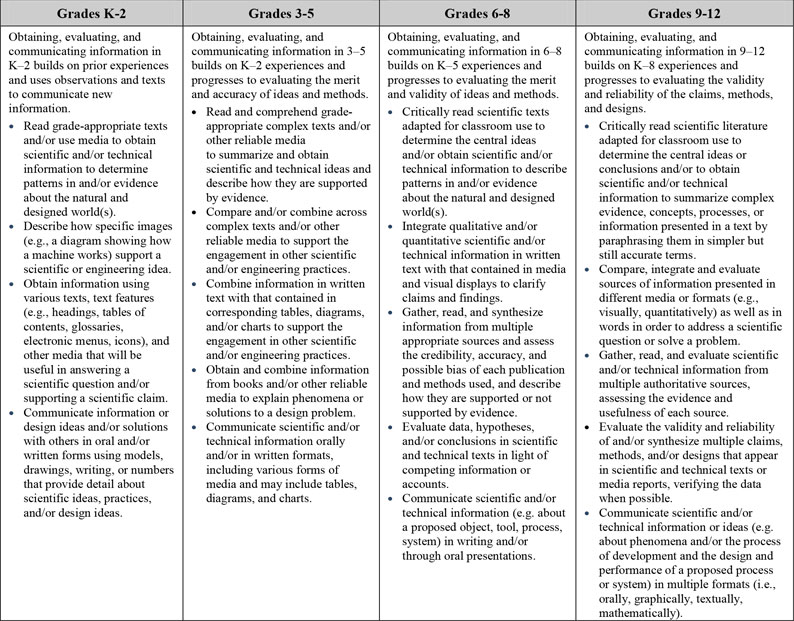Obtaining, Evaluating & Communicating Information
Science
Science cannot advance if scientists are unable to communicate their findings clearly and persuasively or to learn about the findings of others. A major practice of science is thus the communication of ideas and the results of inquiry—orally, in writing, with the use of tables, diagrams, graphs, and equations, and by engaging in extended discussions with scientific peers. Science requires the ability to derive meaning from scientific texts (such as papers, the Internet, symposia, and lectures), to evaluate the scientific validity of the information thus acquired, and to integrate that information.
Engineering
Engineers cannot produce new or improved technologies if the advantages of their designs are not communicated clearly and persuasively. Engineers need to be able to express their ideas, orally and in writing, with the use of tables, graphs, drawings, or models and by engaging in extended discussions with peers. Moreover, as with scientists, they need to be able to derive meaning from colleagues’ texts, evaluate the information, and apply it usefully. In engineering and science alike, new technologies are now routinely available that extend the possibilities for collaboration and communication. (Framework, p. 53)
See A Framework for K-12 Science Education, 2012, p. 74 for the entire text for Practice 8: Obtaining, evaluating and communicating information.
In the video below from BozemanScience.com, Paul Andersen explains how scientists and engineers spend over half of their working day reading, evaluating and producing text. Therefore it is important that we produce students that have a high level of scientific literacy.
For more information, refer to the Science Notebooks Podcast (requires Adobe Flash); the Science Notebooks Presentation on prezi.com created by MPRES Faculty Member John Graves (included below); and the Literacy in Physics: Reading a Primary Source video from TeachingChannel.org (also included below).
Obtaining, Evaluating & Communicating Information Progression through Gradebands:

Progression from NGSS Appendix F p. 15.
Activities
Four Conceptual Change Activities are included to help teachers and students Confront Beliefs:
- Obtaining, Evaluating & Communicating Information Activity #1: Using Primary Source Material
- Obtaining, Evaluating & Communicating Information Activity #2: Using Graphics as a Source
- Obtaining, Evaluating & Communicating Information Activity #3: Evaluating Resources
- Obtaining, Evaluating & Communicating Information Activity #4: Communicate Observations of an Object
- Additional Resources, including lesson plans, online resources and videos, are also available for this Practice
Also refer to Student Work in the Practice for real-life examples of how MPRES teachers have applied this Practice.
The purpose of the activities is to engage teachers in the Practice of Obtaining, Evaluating & Communicating Information. The emphasis in NOT on the activity itself, but rather the conceptual change related to the Practice. Consumers of the Toolkit are reminded to not get wrapped up in the activity, but rather continually reflect on the conceptual nature of the practice to gain deeper understanding.
Now is the time to engage in a phenomenon that focuses on the practice. Professional Development facilitators provide an opportunity for learners to obtain, evaluate, and communicate.
To facilitate conceptual change throughout each activity, you should consider the following questions. These questions are also repeated at key points in each activity to assist you.
Awareness Questions:
- From the background information, what new awareness do you have about obtaining, evaluating & communicating information?
- In a 3-Dimensional classroom, who do you think needs to be obtaining, evaluating & communicating?
- What questions did the background raise for you?
Expose Belief Questions:
- What are your current beliefs about this practice?
- In what ways do you think you are using this practice?
- What challenges do you see to using this practice?
Debrief activities by focusing on the conceptual understanding of the practice using the following prompts.
Resolve Belief Questions:
- In what ways did this activity change your beliefs about obtaining, evaluating and communicating?
- How can you foster the understanding of obtaining, evaluating and communicating information for your students?
- What can you do to make this practice a part of every learner’s repertoire?
Extend the Concept Questions:
- How do you currently help students apply this practice in your classroom?
- Review a recent lesson you taught and evaluate the effectiveness of obtaining, evaluating and communicating.
Go Beyond Questions:
- Ask a colleague to observe one of your lessons OR video yourself teaching and provide feedback on how you implement obtaining, evaluating and communicating information in your classroom.
- Use the EQuiP Rubric for Lessons & Units: Science (PDF format) to evaluate a recent science lesson you taught.